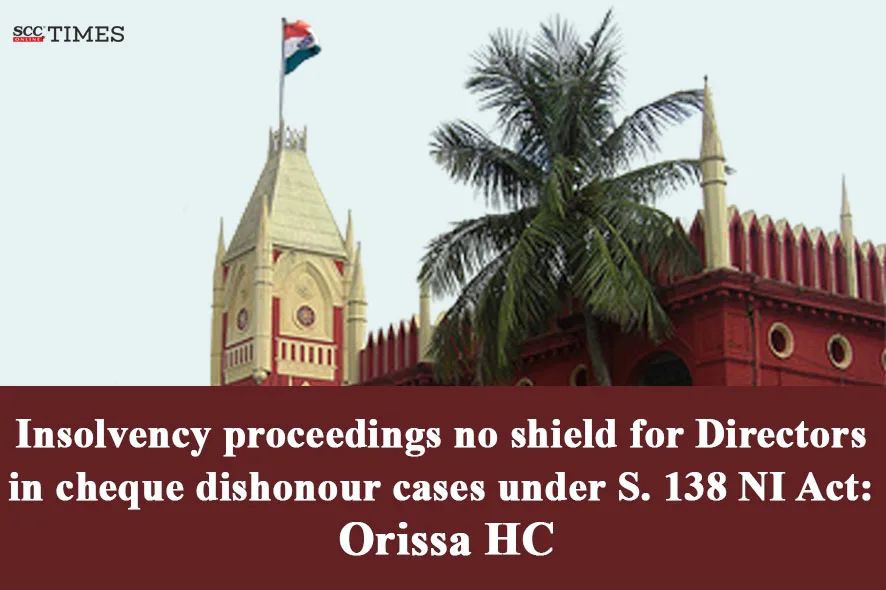Orissa High Court: In the present petition, the petitioner, Managing Director of Zenith Mining (P) Ltd., sought discharge from a cheque bounce case filed by Dewy Developers (P) Ltd., citing insolvency proceedings under Section 7 of the Insolvency and Bankruptcy Code, 2016 (‘IBC’) and arguing that only the appointed Resolution Professional (‘RP’) was entitled to represent the company. A Single Judge Bench of Chittaranjan Dash, J., while dismissing the petition, held that the mere declaration of a company as insolvent and the appointment of a RP under the IBC did not, by itself, absolved its directors from criminal liability for cheque dishonour under Section 138 of the Negotiable Instruments Act, 1881 (‘NI Act’).
Background:
The case arose from a complaint filed by Dewy Developers (P) Ltd. under Section 138 of the NI Act before the JMFC (LR), Bhubaneswar. The complaint stated that Zenith Mining (P) Ltd., through its Managing Director, persuaded the complainant to extend a friendly loan of Rs 1 crore. The amount was credited to the company’s account with the assurance of repayment within one year.
Upon default, the complainant approached the Managing Director, who issued a cheque dated 25-06-2021 for Rs 1 crore drawn on IndusInd Bank. The cheque was dishonoured twice with the endorsement “refer to drawer.” Despite statutory notice, the petitioner failed to make payment, prompting the complainant to initiate criminal proceedings under Section 138 of the NI Act.
In response, the petitioner filed an application seeking discharge from the proceedings, citing insolvency proceedings initiated under Section 7 of the IBC. The petitioner argued that the company was declared insolvent by the National Company Law Tribunal (‘NCLT’), Cuttack on 08-01-2024, and that only the appointed RP was authorised to represent the corporate debtor.
However, the Trial Court rejected the discharge application, holding that criminal prosecution under Section 138 of the NI Act could not be terminated against signatories or Directors of a company. Challenging the dismissal order, the petitioner moved the Court by way of a criminal revision petition.
Analysis and Decision:
The Court while examining the position of law relied upon Ajay Kumar Radheshyam Goenka v. Tourism Finance Corporation of India Ltd., (2023) 10 SCC 545, wherein it was held that the complainant ought to have approached the RP, who alone was competent to represent the accused Company.
The Court thus concluded that there was no ambiguity in law regarding the principle laid down by the Supreme Court in Ajay Kumar Radheshyam Goenka (supra), namely, that the matter pending before the RP, pursuant to the NCLT’s order dated 08-11-2024, would not affect criminal proceedings under Section 138 of the NI Act.
Consequently, the Court held that such proceedings could not be stalled on the ground of insolvency. Finding the Trial Court’s order rejecting the discharge plea to be just and proper, the Court confirmed the same and dismissed the petition as devoid of merit.
[Syed Najam Ahmed v. State of Orissa, 2025 SCC OnLine Ori 3842, decided on 13-10-2025]
Advocates who appeared in this case:
For the Petitioner: Sidhartha Mishra, Advocate
For the Opposite Parties: A. K. Apat, Addl. P. P., S. S. Padhy, Advocate


